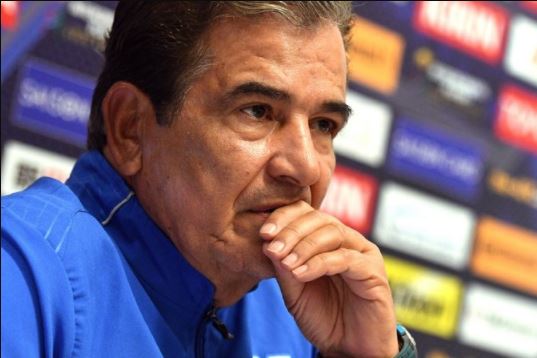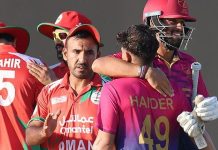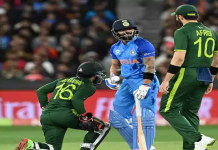-
Sacking of Jorge Luis Pinto as UAE manager may lead to hiring of someone more familiar with the local football landscape
When Jorge Luis Pinto lost his job as UAE manager earlier this week, he became the second man in a row to do so without taking charge of a single competitive match.
He was also the 38th manager that has taken and left that post since the creation of the UAE FA, and national team, in 1972.
Circumstances have clearly played a part. The COVID-19 pandemic has meant that the UAE’s faltering 2020 World Cup qualifying campaign, which Pinto had been hired to resurrect, had been delayed till next year, while the long suspension of all sporting activity saw to it that he barely had any time to spend with his squad. Add to it the fact that, for the few friendly matches he oversaw, Pinto was missing key players like the injured Omar Abdulrahman and others involved in AFC Champions League football, and in hindsight he never really stood a chance.
Such managerial turmoil remains unsustainable, but sadly prevalent.
The benefits of a stable environment for players and coach to work in are well established and this is something that the UAE have not had since the relatively successful, and serene, five years under Mahdi Ali – an era that saw a Gulf Cup triumph in 2013 and an AFC Asian Cup semi-final in 2015.
Since then, the UAE’s second golden generation has plateaued, with Eduardo Bauza, Alberto Zaccheroni, Bert van Marwick, Ivan Jovanovic and now Pinto, all failing to dramatically improve the team’s fortunes. Not surprising, when historically the incumbency lifespan stands at 1.26 years per coach. The statistics are unforgiving.
Also Read: Winless Odisha FC face in-form ATK Mohun Bagan
Saudi Arabia has had 29 coaches in the 69 years since the national team was established at a rate of 2.13 years per incumbent. Healthier than the UAE, and no doubt playing a part in winning two AFC Asian Cup wins in 1984 and 1988 and qualifying to five World Cup finals. Even then, impatience with managers, particularly in the lead to these World Cup appearances, has led to some very inconsistent and poor performances when it mattered.
Unfortunately, managerial changes in the Middle East has become a bit of sport in itself, with the coaches rarely given genuine opportunities to implement any sort of philosophy or long-term plan. The players for their part are subjected to one systematic change after another. Chaos inevitably ensues.
To put it in context, Germany have had one coach in the last 14 years, three this century and an astonishingly meagre eight since 1970. It is of course unfair, if not outright pointless, to compare Germany’s peerless footballing history to that of a Middle Eastern, or indeed any other, team. On the other hand, what the German model does show is that an average of 6.25 years in the job affords a coach time to mould a team in his own image which very often leads to success.
In contrast, the Netherlands, which produces some of the world’s best footballers and often easily the equal or better than their German counterparts, has suffered due to the constant coaching changes. Their rate of 1.9 years/coach since 1970 compares badly to Saudi’s, never mind Germany’s. As does their one major trophy – Euro 1988 – to Germany’s historical record of four World Cup triumphs and three European Championships.
Italy has had only 16 coaches in the last 50 years (3.12 years/coach) and been rewarded with two World Cup wins in that time. And perhaps no international team’s history highlights the importance of stability more than Argentina. From 1974 to 1990, Cesar Luis Menotti and Carlos Bilardo each coached the national team for eight years, with each ending their reign with famous World Cup wins. Since then, several gifted generations have suffered from diminishing returns under an increasing number of coaches.
Such stability is unheard of in this part of this world, and while football associations have been known to exercise very little patience, part of the problem remains that players’ attitudes can have major influence on the lifespan of managerial appointment if they are unhappy with his methods. Indulging player power rarely ends well for the coach, or team.
Conversely, when an association methodically hires a coach to fit the culture of its footballers, success follows. Famously UAE players found the physically taxing training methods of Englishman Don Revie hard to adapt to when he took over the national team in 1977. The steps taken in the aftermath of his departure resulted in marked progress.
It is no surprise that having only three managers throughout the 1980s led to the country’s greatest football achievement by the end of the decade.
Admired Iranian coach Heshmat Mohajerani saw a period of calm and improvement from 1980 to 1984. After that, with the players showing a clear affinity, and public preference, for South American coaching, Brazilians Carlos Alberto Parreira (1984-1988) and Mario Zagallo (1988-1990) between them almost qualified to the 1986 World Cup in Mexico and then miraculously made it to Italia 1990 (Parreira returned to replace Zagallo for that tournament).
The UAE would not experience such stability, or a concerted period of improvement and success, until Mahdi Ali, who had previously overseen the rise of a generation at age group levels, took charge between 2012 and 2017. His stint, as with the Brazilians in the 1980s, saw a genuine bond between coach and players.
Perhaps lessons are at long last being taken on board, with the UAE FA already announcing that they will be hiring someone who has already worked in the country and that the new man would be allowed to continue in his current club role. This has led to speculation that Abdulaziz Al-Anbari, coach of champions Sharjah, or Marcel Keizer of Al-Jazira, could be next in line. The latter, crucially, already works on a daily basis with a significant number of players from the national team.
Also Read: ISL: FC Goa’s Tlang suspended for one additional game
Whoever comes next will hope that he is given the respect and time that Mohajerani, Parreira, Zagallo and Mahdi Ali enjoyed. Otherwise, he will become just one more forgotten statistic.




